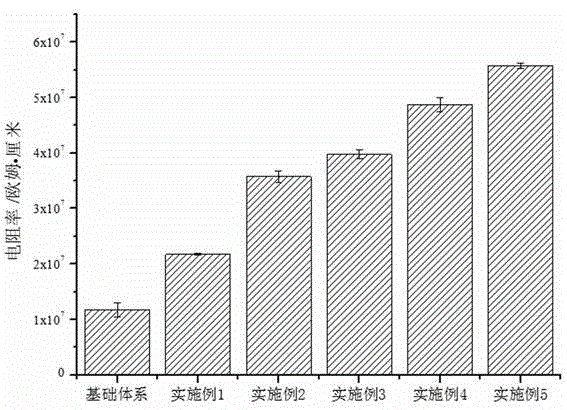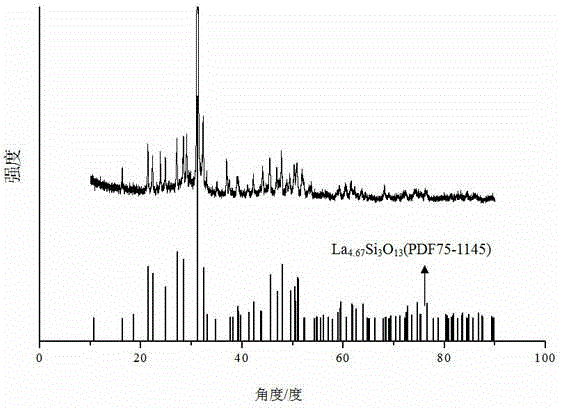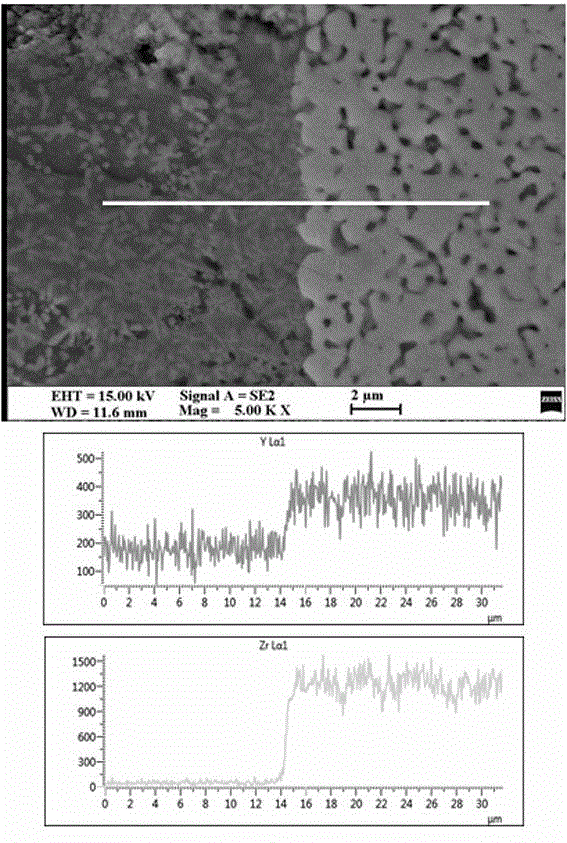Ce and La codoped modified sealing-in microcrystalline glass
A technology of glass-ceramics and co-doping, which is applied in the field of solid oxide fuel cells, can solve the problems of destroying the insulation of sealed glass-ceramics, and achieve the effects of low cost, enhanced network structure, and improved insulation
- Summary
- Abstract
- Description
- Claims
- Application Information
AI Technical Summary
Problems solved by technology
Method used
Image
Examples
Embodiment 1
[0032] Embodiment 1: Preparation and sealing of materials
[0033] According to the ratio of each component in Table 1, weigh a certain amount of analytically pure raw materials (CaO, SrO, SiO 2 、Al 2 o 3 , B 2 o 3 , CeO 2 and La 2 o 3 ), and mixed evenly with a planetary ball mill for 24 hours; then put the powder into a platinum crucible, place it in the air atmosphere of a box-type resistance furnace, heat it to 1400°C at 3°C / min, and keep it warm for 1 hour; then, take out the crucible, Pour the melt into deionized water for rapid cooling, and dry to obtain fragments of glass melt; grind and pass through a 100-mesh sieve to obtain glass powder. Mix glass powder with polyvinyl alcohol, fish oil, ethanol and toluene (80%, 2%, 1%, 10%, 7% by weight) to form a slurry, and disperse evenly in a ball mill; tape casting, natural Dry, then cut into the embryo body of the desired shape; place the embryo body on the part to be sealed, heat up at a rate of 2°C / min in an electr...
Embodiment 2
[0034] Embodiment 2: Preparation and sealing of materials
[0035] According to the ratio of each component in Table 1, weigh a certain amount of analytically pure raw materials (CaO, SrO, SiO 2 、Al 2 o 3 , B 2 o 3 , La 2 o 3 ), use a planetary ball mill for 24 hours to mix evenly; then put the powder into a platinum crucible, place it in the air atmosphere of a box-type resistance furnace, heat it to 1400°C at 3°C / min, and keep it warm for 1 hour; then, take out the crucible, Pour the melt into deionized water for rapid cooling, and dry to obtain fragments of glass melt; grind and pass through a 100-mesh sieve to obtain glass powder. Mix glass powder with methylcellulose, polyvinyl alcohol, n-butanol and acetone (82%, 2%, 2%, 8%, 6% by weight) to form a slurry, and disperse evenly in a ball mill; Stretching, drying naturally, and then cutting the embryo body into the desired shape; placing the embryo body on the part to be sealed, raising the temperature in an electric...
Embodiment 3
[0036] Embodiment 3: Preparation and sealing of materials
[0037] According to the ratio of each component in Table 1, weigh a certain amount of analytically pure raw materials (CaO, SrO, SiO 2 、Al 2 o 3 , B 2 o 3 , CeO 2 and La 2 o 3 ), use a planetary ball mill for 24 hours to mix evenly; then put the powder into a platinum crucible, place it in the air atmosphere of a box-type resistance furnace, heat it to 1400°C at 3°C / min, and keep it warm for 1 hour; then, take out the crucible, Pour the melt into deionized water for rapid cooling, and dry to obtain fragments of glass melt; grind and pass through a 100-mesh sieve to obtain glass powder. Mix glass powder with epoxy resin, polyacrylamide, isopropanol and toluene (84%, 1.5%, 0.5%, 9%, 5% by weight) to form a slurry, and disperse evenly in a ball mill; casting Shape, dry naturally, and then cut into the desired shape of the embryo body; place the embryo body on the part to be sealed, heat up at a rate of 2°C / min in...
PUM
 Login to View More
Login to View More Abstract
Description
Claims
Application Information
 Login to View More
Login to View More - R&D
- Intellectual Property
- Life Sciences
- Materials
- Tech Scout
- Unparalleled Data Quality
- Higher Quality Content
- 60% Fewer Hallucinations
Browse by: Latest US Patents, China's latest patents, Technical Efficacy Thesaurus, Application Domain, Technology Topic, Popular Technical Reports.
© 2025 PatSnap. All rights reserved.Legal|Privacy policy|Modern Slavery Act Transparency Statement|Sitemap|About US| Contact US: help@patsnap.com



